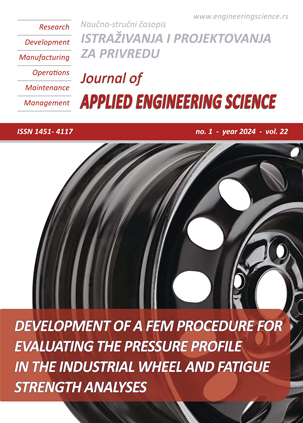IMPACT OF DEVELOPED SOFTWARE PACKAGE APPLICATION FOR THE OPERATION AND MAINTENANCE MANAGEMENT ON IMPROVING THE VEHICLE FLEET ENERGY EFFICIENCY
Abstract
In order to improve the energy efficiency of the vehicle fleets, many countries have introduced laws, regulations and politics that encourage the use of vehicles with lower fuel consumption and lower emissions of harmful gases. Also, many companies have adopted strategies for lowering emissions of harmful gases, maintenance costs and vehicle exploitation, including the use of software packages for operation management and maintenance of vehicle fleets. On the international market there are numerous of already made software packages for the operation management and maintenance of vehicle fleets. Some of the companies, having in mind the specificity of business or vehicle exploitation, have decided to develop their own software packages for operation management and maintenance of vehicle fleets. One of them is the company „SRBOLAB“ DOO. This paper analyzed the impact of the developed software package on the energy efficiency of the company's vehicle fleet. Firstly, it describes the structure of the developed software package, and after that, applied measures next to the software package, in order to improve energy efficiency and obtained results in the form of an analysis of the energy efficiency of the observed vehicle fleet before and after the implementation of software and measures. Analysis has shown that, regardless of the increased business, the total fuel consumption (l) and mileage (km) are higher after the implementation of software, as well as the energy efficiency of the observed vehicle fleet per CE groups which is reduced to specific fuel consumption (l/100km). Obtained results show that the differences in the specific fuel consumption (l/100km), before and after the implementation of software per CE groups, are in the range of 0,32 l/100km to 1,26 l/100km, in other words, fuel savings are from 4,1 % to 16,8%, if you look at this in percentages. Obtained results in comparison to the size, spent fuel (l), are showing savings in the range of 89 l to 342 l. Total fuel savings (l) for the observed vehicle fleet in the period of January to April 2023 is 626 l.
References
Europe Environment Agency, (2023) Trends and Projections in Europe 2023, https://www.eea.europa.eu/publications/trends-and-projections-in-europe-2023. [Accessed 01 February 2024].
Vujanović D. B., Mijailović R. M., Momčilović V. M., Papić V. D., (2010) Energy Efficiency as a Criterion in the Vehicle Fleet Management Process,Thermal Science, vol. Vol. 14, no. DOI: 10.2298/TSCI090719010V, pp. pp. 865-878.
Radosavljević D. M., Manojlović A. V., Medar O. M., Bojović N. J., (2018) Vehicle Fleet Energy Efficiency – Influence on Overall Vehicle Effectivenes, Thermal Science,Vol. 22 doi.org/10.2298/TSCI170926074R, pp. pp. 1537-1548.
Manojlović A. V., Papić V. D., Filipović S. M., Jovanović V. D., (2011) Fleet Renewal: An Approach to Achieve Sustainable Road Transport, Thermal Science, Vol. 15, DOI: 10.2298/TSCI110504111M, pp. pp. 1223-1236.
Musonda E., (2020) Design and Development of a Web Based Vehicle Management System (VMS), The International Journal of Multi-Disciplinary Research, no. CFP/1588/2020, pp. 1-17.
Oluwashola S.A., Ige O., (2022) Design and Deployment of Vehicle Information System for Data Mining and Management, International Journal of Engineering Research & Technology (IJERT), vol. 11, no. 02, pp. 455-462.
Verzion Connect, https://www.verizonconnect.com/. [Accessed 30 May 2023].
Motive, Motive Technologies, Inc., 2013.https://gomotive.com/solutions/trucking-logistics/. [Accessed 30 May 2023].
Azuga, Azuga, a Bridgestone Company, https://www.azuga.com/fleet-management-software. [Accessed 31 May 2023].
Samsara, Samsara Inc., https://www.samsara.com/. [Accessed 31 May 2023]
Chen X.-M., Wei Z.-H., (2011) Vehicle management system based on multi-node RFID cards, in Proceedings of the 30th Chinese control conference
Fernandez B.S.M., (2021) Vehicle Management System Using RFID, International Journal of Multidisciplinary Research and Analysis, vol.4/2021, DOI: 10.47191/ijmra/v4-i12-22, pp. 1923-1928.
Republic Hydrometeorological Service of Serbia, Republic of Serbia, https://www.hidmet.gov.rs/latin/meteorologija. [Accessed 1 April 2023].

